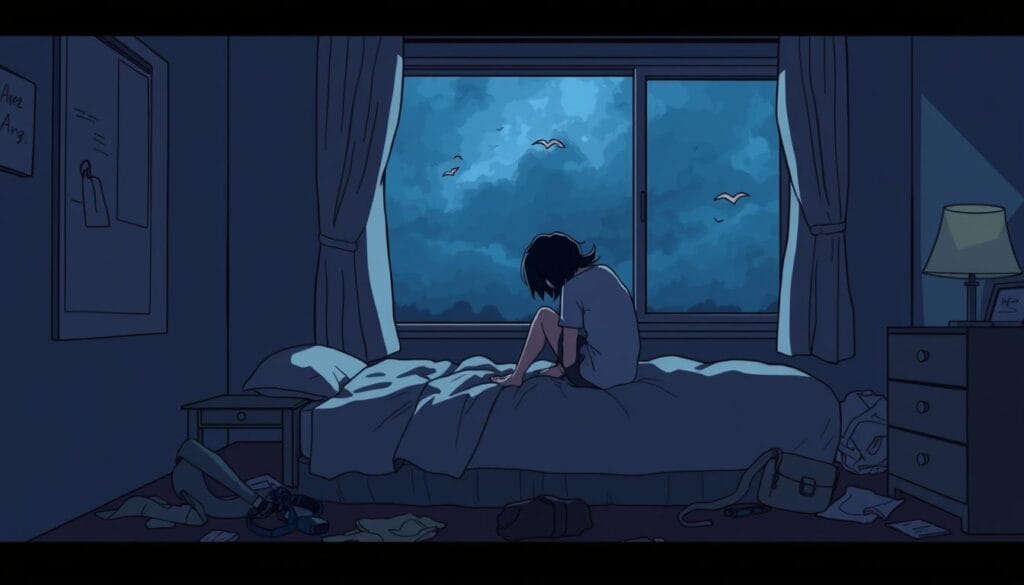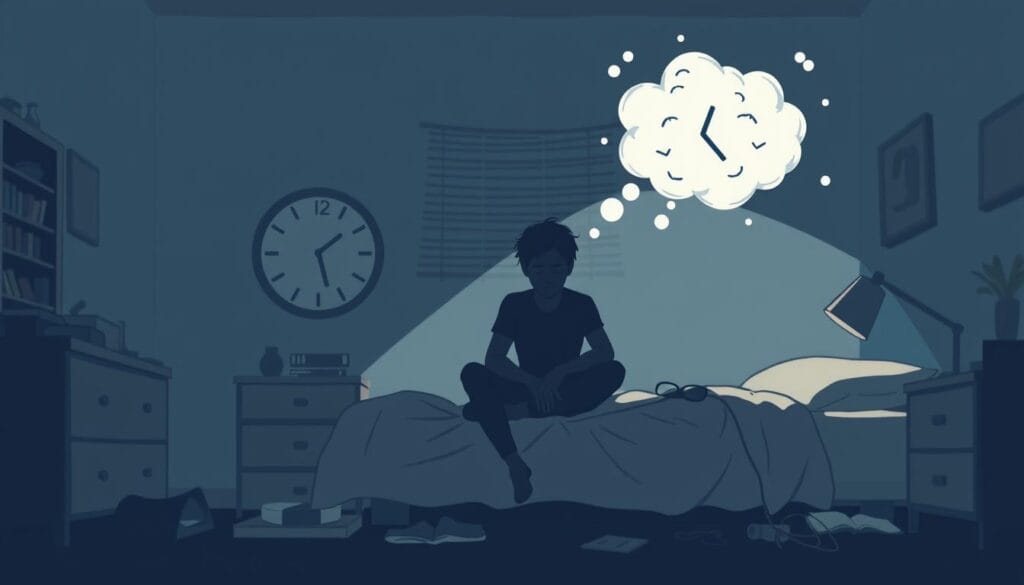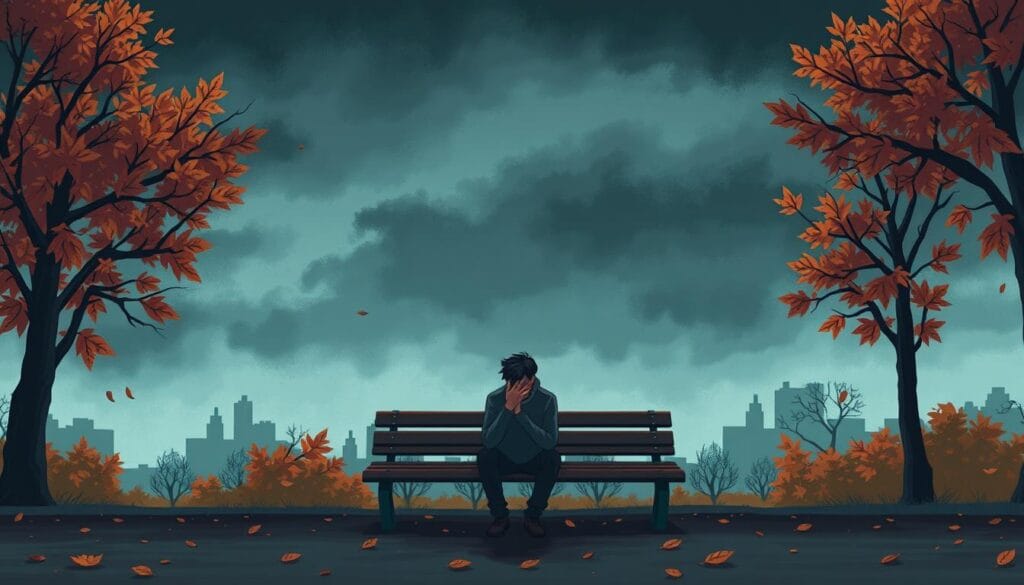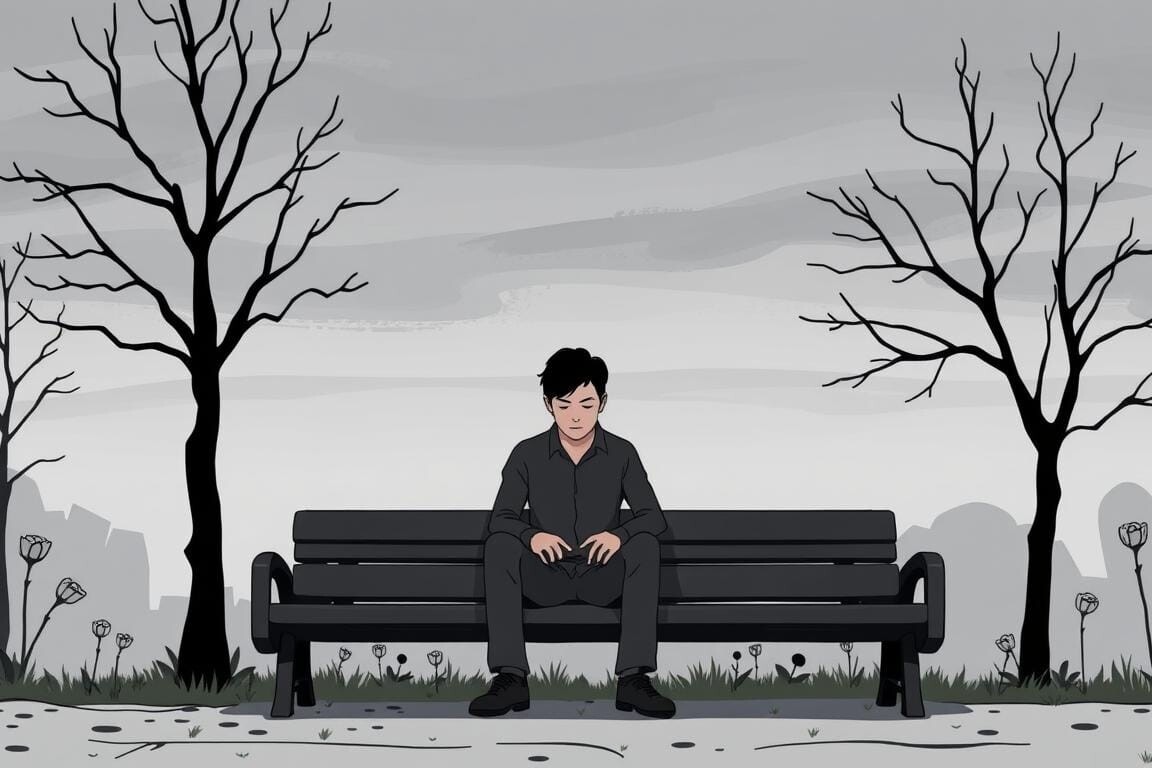Dr. Chandril Chugh is a top mental health expert. He wants to help men understand depression better. In this article, he talks about the signs of depression in men. He aims to help you spot these signs and improve your mental health.
Depression is a complex issue that affects everyone. But, men often show different symptoms than what’s commonly known. Knowing these signs can help you tackle depression and care for your mental health.
Dr. Chugh explains the emotional, physical, and mental symptoms men with depression might have. He covers sadness, fatigue, and risky behavior. By knowing these signs, you can get help and take back control of your mental health.
If you’re dealing with depression or worried about someone you love, this article is for you. Dr. Chandril Chugh offers important insights and tips. Start your journey to better mental health and find a more fulfilling life.
Table of Contents
ToggleUnderstanding Depression in Men
Depression is a complex mental health issue that affects everyone. But, it shows up differently in men than in women. It’s important to know these differences to help men with their mental health.
Men with depression might feel sad all the time, lose interest in things they used to like, and get angry easily. They might also feel tired, have changes in appetite or sleep, and find it hard to focus. These symptoms can really affect a man’s life and how he relates to others.
Men often face a big challenge because of what society expects from them. They’re expected to be strong, not show emotions, and be able to handle everything on their own. This makes it hard for them to admit they need help with their mental health. So, they might not get the help they need, making things worse.
Jobs that are mostly for men, like construction or being in the military, can also make depression more likely. These jobs are stressful and can lead to trauma. This adds to the mental health challenges men already face.
It’s key to understand how depression affects men differently. This knowledge helps doctors, family, and friends support men better. Together, we can make it easier for men to get the help they need for their mental health.
Emotional Symptoms of Depression in Men
Depression affects men and women in different ways. It’s important to know how depression shows up in men. Men often show sadness as irritability, anger, or losing interest in fun activities.
Persistent Sadness or Emptiness
Men with depression often feel sad or empty for a long time. This feeling can last for weeks or months. It affects their daily life, work, and relationships.
They might feel hopeless, worthless, or unable to feel joy. This makes their life very hard.
Loss of Interest in Activities
Men with depression lose interest in things they used to love. They might stop doing hobbies, social activities, or even taking care of themselves. This makes them feel even more alone and sad.
Irritability and Anger
Many men with depression get irritable and angry. They might get frustrated easily, have outbursts, or act aggressively. This is a way for them to deal with their depression.
It’s key to spot these signs of depression in men early. This way, we can help them get the right treatment and support. Understanding how depression shows up in men helps us support them better.

Physical Symptoms of Depression in Men
Depression can show up in many ways, not just in how we feel. Men with depression might feel very tired or have trouble sleeping. They might also notice changes in how much they eat and their weight. Spotting these signs is key to getting help.
Fatigue and Low Energy
Feeling very tired is a big sign of depression in men. Even after a full night’s sleep, they might still feel exhausted. This can make it hard to do simple things and hurt their daily life.
Sleep Disturbances
Problems sleeping are common in men with depression. Some can’t fall asleep or stay asleep. Others sleep too much, trying to hide from their feelings. Bad sleep can make depression worse, creating a cycle.
Changes in Appetite and Weight
Depression can also affect how much men eat and their weight. Some might eat less and lose weight, while others might eat more and gain weight. These changes can make them feel worse about themselves.
Cognitive and Behavioral Symptoms
Depression can affect a man’s thinking and actions. This part talks about symptoms like trouble focusing, being indecisive, and acting recklessly. Knowing these signs can help spot depression and offer support.
Difficulty Concentrating
Men with depression often struggle to focus. This makes it hard to do well at work or enjoy hobbies. It’s a common problem for those with depression.
Indecisiveness
Depression can make it hard to decide what to do. Men might put off important choices or feel stuck. Overcoming this indecisiveness is key to managing depression.
Reckless or Self-Destructive Behavior
- Some men with depression might act recklessly, like drinking too much or taking risks. They might also harm themselves.
- These actions are often a way to deal with pain or show they don’t care about themselves. It’s important to see and treat these behaviors as part of depression treatment.
Spotting the signs of depression in men is crucial. It helps in offering the right help and support. Understanding how depression affects thinking and actions helps everyone involved.

Symptoms of depression in men
Depression shows up differently in men than in women. Men might not show their feelings in the same way. It’s important to know the signs of depression in men to get help early.
Men often feel sad or empty but might not talk about it. Instead, they might get angry or irritable. They might also stop doing things they used to love, which can make them feel even more alone.
- Persistent sadness or feelings of emptiness
- Loss of interest in activities and hobbies
- Increased irritability, anger, or hostility
Depression can also make men feel very tired or have trouble sleeping. They might eat less or more than usual, which can be a sign of depression too.
Men with depression might have trouble focusing or making decisions. They might also take risks or do things that could hurt themselves, like using drugs or alcohol. These signs can make it harder for men to see they need help.
If you or someone you care about is showing these signs, getting help is key. Getting help early can really help in fighting depression.
The Unique Challenges for Men with Depression
Men with depression often face unique challenges. These can make it hard for them to seek help and care for their mental health. [https://www.aamc.org/news/men-and-mental-health-what-are-we-missing] Societal stigmas and gender-specific barriers make it tough for men to talk about their depression.
Men often downplay or don’t recognize depression symptoms. They might see it as just stress. This leads to fewer diagnoses, even though men are more likely to die by suicide or abuse substances. The fear of being seen as weak or unmanly also stops men from getting help.
- Just 1 in 3 men took medication for daily feelings of depression or anxiety, with just 1 in 4 speaking to a mental health professional.
- White men aged 85 years and older are most at risk of suicide.
- Of those who receive a schizophrenia diagnosis by the age of 30 years, 90% are men.
Men also face gender-specific barriers, like feeling they must be self-reliant. They might be unsure about psychotherapy. [https://www.aamc.org/news/men-and-mental-health-what-are-we-missing] Men are less likely to talk about their mood to doctors, which affects how they seek help.

It’s important to tackle these challenges to support men’s mental health. [https://www.aamc.org/news/men-and-mental-health-what-are-we-missing] Understanding the barriers men face helps us create a better environment for them to care for their mental health.
The Importance of Early Intervention
It’s key to spot and tackle depression in men early on, Link Between Depression And Suicide. Early action can greatly change a man’s mental health path. Spotting signs and getting help fast can lessen depression’s effects and boost well-being.
Consequences of Untreated Depression
Ignoring depression can make it worse. It can hurt a man’s personal and work life. It can also harm relationships and job skills, raising the risk of suicidal thoughts. The sooner depression is treated, the better.
Seeking Professional Help
- Men feeling depressed should get help from a therapist or counselor.
- A mental health expert can give a full check-up, find the cause, and create a plan just for you.
- Getting help early and right can help men take back control of their mental health. It can also make life better and lower the risk of serious problems.
Looking for professional help shows courage, not weakness. By focusing on mental health and tackling depression, men can find a more rewarding and lasting path to happiness.
Strategies for Coping with Depression
Men can fight depression by themselves, but getting help from a doctor is key. This part talks about ways to feel better, like exercising, staying connected with friends, and using mindfulness. These steps help men take charge of their mental health and feel better overall.
Exercise and Physical Activity
Exercise is a big help against depression. Try walking fast, jogging, swimming, or lifting weights. It makes you feel happier, less stressed, and healthier. Try to exercise for 30 minutes each day. Pick activities you like to keep doing them.
Social Support
Having friends and family is very important for men with depression. Talk to your loved ones about how you feel. Doing things with others, like going out or doing hobbies, makes you feel connected. It’s okay to ask for help when you need it.
Mindfulness and Relaxation Techniques
Using mindfulness and relaxation can really help with depression. Try meditation, deep breathing, or yoga. These can lower stress, help you focus, and make you feel better. They help you deal with bad thoughts and feelings, making recovery easier.

Treatment Options for Depression in Men
If you’re a man struggling with depression, know you have many ways to get help. You can try psychotherapy, medication, and lifestyle changes. These can help manage your symptoms and improve your well-being.
Psychotherapy
Talking to a mental health professional can really help. Cognitive-behavioral therapy (CBT) can change negative thoughts and teach coping skills. Interpersonal therapy (IPT) helps improve your relationships and communication, which can also help with depression.
Medication
Antidepressant medications, like SSRIs or SNRIs, can help. They balance your brain’s chemicals to ease symptoms. It’s key to work with your doctor to find the right medication and dosage for you.
Lifestyle Changes
- Regular exercise can boost your mood and well-being.
- Eat a healthy, balanced diet with nutrient-rich foods.
- Get 7-9 hours of sleep each night for better health.
- Reduce stress with relaxation techniques like meditation or mindfulness.
- Avoid too much alcohol and substance abuse, as they can make depression worse.
Exploring these treatment options for depression in men is a big step towards better mental health. With the right support and self-care, you can beat depression and live a fulfilling life.
Supporting a Loved One with Depression
When a man in your life is struggling with depression, your support can help a lot. Depression is treatable, and your help can guide them through it.
Understanding and Empathy
Start by learning about depression in men. Knowing the signs helps you talk and show empathy. Don’t downplay their feelings or give advice without being asked. Just listen and understand.
Encouraging Professional Help
Encourage them to see a doctor or therapist. Men often don’t want to talk about it. Your support can help them feel more comfortable.
Offer to help find a doctor or go with them to appointments. This shows you’re there for them.
Creating a Supportive Environment
Depression can make people want to stay away from others. Make a caring space by checking in and inviting them to fun activities. Let them share their feelings without fear of judgment.
Don’t be too hard on them. Help them take small steps towards getting better.
Supporting someone with depression takes patience and understanding. By being empathetic, encouraging help, and creating a caring space, you can help them heal.
Conclusion
As we wrap up our look at depression in men, it’s clear we need a wide range of solutions. We must understand depression in men better. This way, we can help men feel okay about talking about their feelings.
It’s important to know how depression affects men differently. This includes how traditional ideas of being a man can hurt them. Also, men are more likely to try to take their own lives. And, they might not react the same way to antidepressants.
We all have a role in helping men with depression. This includes everyone, from doctors to friends. By being kind and understanding, we can help men feel safe to ask for help.
Together, we can make a change. We can make a world where men feel free to talk about their feelings. This way, they can live happy and fulfilling lives.
FAQ
What are the unique symptoms of depression in men?
Depression in men can show differently. Symptoms include feeling sad or empty, losing interest in things, and getting angry easily. They might also feel tired, have trouble sleeping, or eat less.
Other signs are trouble focusing, making decisions, or acting recklessly.
How does depression in men differ from depression in women?
Depression affects both men and women but shows differently. Men might show anger or take risks more than women. Women often show sadness and withdraw more.
Why is it important to recognize depression in men?
It’s key to spot depression in men early. If not treated, it can get worse. It can harm relationships, work, and even lead to suicidal thoughts.
Helping men get help can greatly improve their mental health.
What are the unique challenges men face in addressing their depression?
Men often struggle to admit they’re depressed because of societal views. They might see it as weak or not masculine. They might also feel they should handle it alone.
It’s important to understand and help overcome these barriers.
What are some effective coping strategies for men with depression?
Men can fight depression with self-care. Regular exercise, staying connected with friends, and using mindfulness help. These steps empower men to manage their depression.
What are the treatment options available for depression in men?
Treating depression in men needs a mix of approaches. This includes therapy, medication, and lifestyle changes. Working with a healthcare provider to find the right plan is key.
How can loved ones support a man with depression?
Supporting a man with depression means being understanding and empathetic. Encourage him to get help and create a supportive space. Be patient, listen without judging, and offer help when needed.
Source Links
About The Author

Medically reviewed by Dr. Chandril Chugh, MD, DM (Neurology)
Board-Certified Neurologist
Dr. Chandril Chugh is a U.S.-trained, board-certified neurologist with expertise in diagnosing and managing neurological disorders, including migraines, epilepsy, Parkinson’s disease, and movement disorders. His clinical focus includes evidence-based neurological care and patient education.
All content is reviewed for medical accuracy and aligned with current neurological guidelines.




